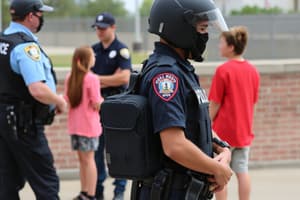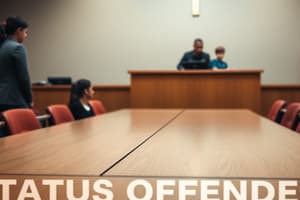Podcast
Questions and Answers
Who is Joe Sullivan?
Who is Joe Sullivan?
Joe was convicted of sexual assault and other charges in adult court at the age of thirteen.
What is implied by the author saying Joe's defense lawyer 'uttered no more than twelve transcript lines at sentencing'?
What is implied by the author saying Joe's defense lawyer 'uttered no more than twelve transcript lines at sentencing'?
The lawyer did a shoddy job and put forth minimal effort.
What does the term 'prison-industrial complex' refer to and how has it impacted sentencing?
What does the term 'prison-industrial complex' refer to and how has it impacted sentencing?
It's for-profit prisons and the business aspect of imprisonment.
Why does the author describe the debacle of getting Joe in his wheelchair out of the cage?
Why does the author describe the debacle of getting Joe in his wheelchair out of the cage?
In 2005, the Supreme Court banned the death penalty sentence for juveniles. Why is this relevant to Joe's case?
In 2005, the Supreme Court banned the death penalty sentence for juveniles. Why is this relevant to Joe's case?
What attribute do most of the author's clients sentenced to life in prison as juveniles share?
What attribute do most of the author's clients sentenced to life in prison as juveniles share?
What irony does the author mention about his advocacy work for children?
What irony does the author mention about his advocacy work for children?
How does the author use scientific child development information to support his position?
How does the author use scientific child development information to support his position?
What challenge does the author face in arguing that life imprisonment sentences for juveniles are cruel and unusual?
What challenge does the author face in arguing that life imprisonment sentences for juveniles are cruel and unusual?
How does the author intend to combat the difficulty in arguing against life sentences for juveniles?
How does the author intend to combat the difficulty in arguing against life sentences for juveniles?
Flashcards
Prison-Industrial Complex
Prison-Industrial Complex
The for-profit system driving harsh sentencing policies.
Death Penalty for Juveniles
Death Penalty for Juveniles
Supreme Court banned it for juveniles in 2005 due to underdeveloped reasoning.
Adolescent Brain Development
Adolescent Brain Development
Juveniles show less impulse control and reasoning compared to adults.
Advocacy Strategy
Advocacy Strategy
Signup and view all the flashcards
Ineffective Counsel
Ineffective Counsel
Signup and view all the flashcards
Juvenile Rehabilitation
Juvenile Rehabilitation
Signup and view all the flashcards
Study Notes
Joe Sullivan's Case
- Joe Sullivan was convicted at age thirteen for sexual assault and related charges, maintaining his innocence regarding the assault itself.
- His involvement in a robbery was coerced by older accomplices.
Lawyer's Lack of Defense
- Minimal effort by Joe's defense attorney led to only twelve lines being presented during sentencing, indicating a failure to advocate effectively for Joe.
Prison-Industrial Complex
- Refers to the for-profit nature of prisons, where economic interests drive harsher sentencing policies.
- Lobbying by private prison companies has influenced Congress towards tougher sentencing laws.
Inhumane Treatment of Disabled Individuals
- Joe, a disabled person, faced dehumanizing treatment in prison, being placed in a cage, which emphasizes the cruel aspects of his punishment.
Supreme Court Ruling Implications
- In 2005, the Supreme Court outlawed the death penalty for juveniles, citing their underdeveloped reasoning.
- This ruling is relevant to Joe's life sentence, suggesting that such sentences for juveniles are also cruel due to their developmental differences.
Change in Juveniles Over Time
- Many clients sentenced to life as juveniles exhibit significant growth in mental capability and maturity when they reach adulthood.
Irony in Advocacy Work
- The author, who advocates for juveniles accused of violent crimes, faced a personal tragedy when his elder grandfather was murdered by juveniles, highlighting the complexity of violence in society.
Scientific Basis for Juvenile Sentencing
- Research illustrates that adolescents exhibit less impulse control and reasoning compared to adults, arguing against equal treatment in legal proceedings.
Challenges in Legal Arguments
- Establishing that life sentences for juveniles are "unusual" is difficult due to over 2,500 children in the U.S. facing such sentences, complicating the legal argument.
Strategic Focus for Advocacy
- To counter the difficulties in arguing against juvenile life sentences, the author’s team plans to target younger offenders (under fifteen) and those convicted of non-homicide crimes for advocacy efforts.
Studying That Suits You
Use AI to generate personalized quizzes and flashcards to suit your learning preferences.




